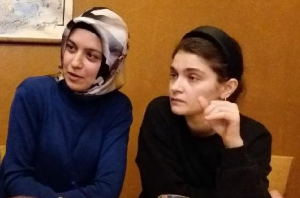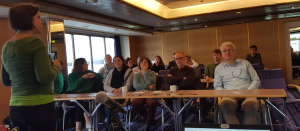Turku University of Applied Sciences (TUAS) has every year a priviledge to host international students from different countries. Most of…
Tekijät | Authors
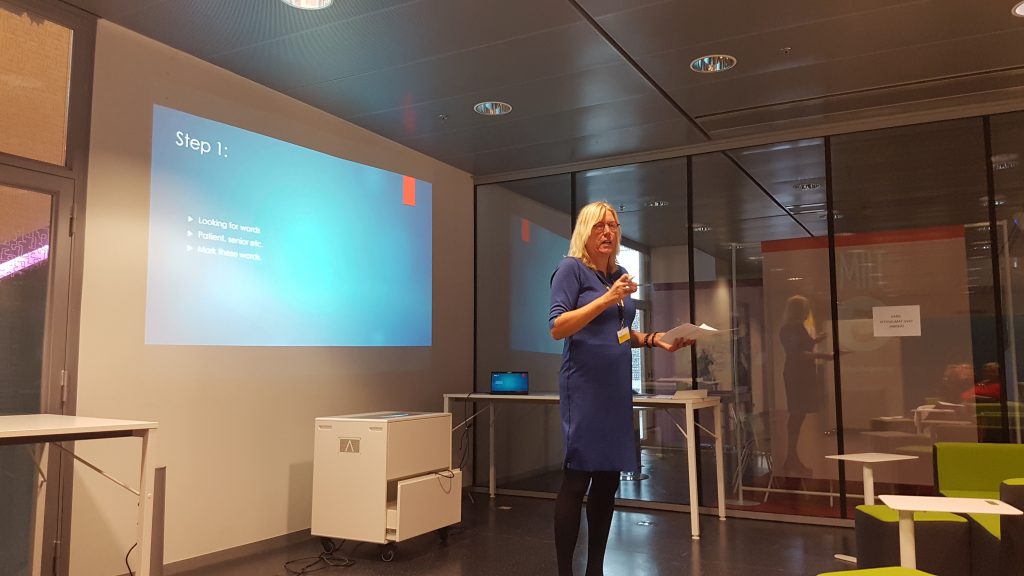
Master School International Seminar 4: International Collaboration – a Source of Innovation and Learning in Master School
International collaboration is a source for innovation and empowerment, not only a source of learning. When connecting with students and teachers and researchers from different countries, you can find new solutions for everyday practice in education and practice and on the other hand feel respect to what you already have.
Internationalisation as a concept includes the policies and practices undertaken by academic institutions and the individuals working and studying in higher education institutes. International higher education institutes exist in almost every European country. The internationalisation of higher education has been influenced by the increased importance of knowledge in related to globalization and driven by a dynamic and constantly evolving combination of political, economic, socio-cultural and academic rationales (European Parliament 2015).
Knowledge and cultural transition in academia
We are part of global academic environment and society. We share interest in education as well as in developing social and health care answering the demands of the working life. In general, the motivation to be active in international collaboration are knowledge and language acquisition, increased cross-cultural understanding, cross-border collaborative education and increase of international RDI activities. Most importantly, enhancing the curriculum with international content is priority in Master level education of higher education environment. The cross-cultural educational preparation for university students, accompanies the movement of students, social and health care professionals, and academic staff across borders.
Definition of internationalisation (European Parliament)
The intentional process of integrating an international, intercultural or global dimension into the purpose, functions and delivery of post-secondary education, in order to enhance the quality of education and research for all students and staff, and to make a meaningful contribution to society.
The roots of the Master education in TUAS
Master education begun in 2001 and law about Master education published in 2005 (Act 411/2005). Since then, the Master’s degree education has been developed through participation in international networks. Efforts have been made to establish international curriculum and education cooperation at Level 7 (EQF). From the beginning, there have also been international projects in the implementation of teaching, when teaching has been integrated as a part of Research, Development and Innovations (RDI). (Ahonen 2010a.)
Examples of networks in social and health care are Thematical European Nursing Network (TENN) and Nordic network GeroProff (Advanced Clinical Geriatric Care in the Nordic Countries). The European Cooperation Network TENN (2001 – 2006) was funded by the European Union. The project, involving 68 training organizations from 26 different countries, was co-ordinated by the United Kingdom. One of the aims of the project was to develop a curriculum for the Advanced Practice Nursing (APN) curriculum in collaboration with several other European universities. In addition, the aim was to raise awareness of clinical expert training as Master-level training in several European countries, including Finland.
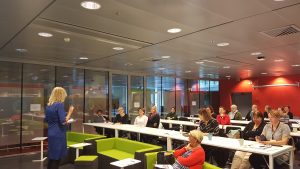
Master education started in international co-operation
In 2008, Turku University of Applied Sciences’ Health Care Department was preparing its own Clinical Expert Training Program application from the Ministry of Education, using the knowledge and understanding acquired within the TENN network as a background orientation for launching new education. The curriculum helped us in the preparation of the curriculum for the degree program. In addition, the curriculum work on a joint European Master-level leadership training was another development line within the network. This work also had an international impact on curriculum work in the Social and Health Care Development and Management Degree Program. The project also produced a ’Handbook’. (St Martin´s College Programme Handbook 2005−2006). (Ahonen & Antikainen 2019.)
GeroProff was a Nordic networking partnership with the aim of developing a Nordic clinical expert Master-level training and launching a joint implementation. The training profile was gerontological nursing. The project was funded by the Nordic Council of Ministers. The GeroProff network comprised 7 Nordic polytechnics and universities. Two key tasks were assigned to networking: identifying the need for a specialist clinical nurse in gerontological nursing and defining the role involved and planning a Joint Master training for a clinical specialist nurse. The network implemented a Nordic Master’s course in gerontological nursing, in which Turku University of Applied Sciences participated. (Ahonen & Heikkinen 2013.)
Master school today in TUAS
Today many of our trainings are realized through international networking. Master students’ their studies and theses are a part of the international RDI projects. Master School in Health and Well-being is an active and innovative learning environment for over 350 students. Many of the teachers have close collaboration with many Nordic, European and global education institutes and associations. For example from the clinical expert education we have now moved forward to advanced clinical practice education with close collaboration to national and international networks. Innovation pedagogy is a foundational element in our curriculums, which provides excellent guidelines for teaching, learning and developing expertise needed in working life.
Every year we have several exchange students in the Master School and few of the Finnish Master students take part in the exchange programmes. However, the current Master programs are mainly implemented in Finnish language and there are limited possibilities to study in English. Therefore, we should seize every opportunity for students to use English and develop their language skills even further. In addition to encouraging more students to go on international exchange, we should increase internationalisation at home (Ministry of Education and Culture 2019).
Our fellows and exchange students participate in courses providing refreshing change in the cultural context of education. But this is not enough. Based on the national curriculum guidelines, international competences are part of European qualification framework level 7. Therefore, we need to offer possibilities for our students to practice their international competences and encourage them to see their work in a wider global context. Also, the teachers are always looking for new opportunities for learning and getting inspired, and the collaboration with the international colleagues offers incredible possibilities for this type of networking.
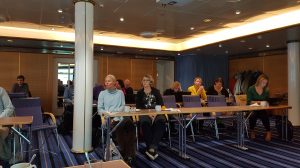
The Master School International Seminar
Master School international seminar is organised annually. The seminar provides the Master students a forum to practice their international competences at home and even create global networks thus leading to new possibilities. The students have also a great chance to widen their cultural knowledge and engage in international collaboration. In the International seminar, the Master students have an opportunity to present their own ePosters in English. This offers a valuable experience to show case their expertise to an international audience. These kinds of authentic situations may feel intimidating to some students, however, often the experience proves to be positive and useful. Interaction with the international guests offers a multitude of natural situations to join interesting discussions in English, share expertise and gain current knowledge on a variety of professional topics.
In the seminar, the students and teachers act as moderators of the sessions. Every year we try to provide some interesting new experiences for our guests and students. The international seminar starts with a get-together evening where all guests, teachers and students have a chance to get to know each other through a casual and fun event. Every year we try to introduce something new and inspiring. Last year it was an introduction to Community Musician Specialisation Study Programme, Musician in the Hospital and Care Field, when we had an energising performance by a local care musician.
Every year Master students play an important role in international seminar: they present their posters and act as moderators. Students appreciate the international seminar as valuable learning experience.
Opiskelijamoderaattorina päivä kului vauhdikkaasti. Moderaattoriksi ryhtyminen vaatii vain ripauksen rohkeutta ja ennakkoluulottomuutta. Päivän aikana sai tutustua ihaniin ihmisiin ja luoda jopa uusia ystävyyssuhteita. Mikäli englannin kielen taito mietityttää, niin tärkeämpää kuin oikein lausuminen ja kielioppi, on heittäytyminen tunnelmaan. Eihän kaikkien esiintyjienkään äidinkieli ole englanti, joten kaikki ovat siinä mielessä samalla viivalla. Ensi vuonna ehdottomasti uudestaan, koska oli sen verran hauska kokemus. Suosittelemme osallistumista lämpimästi. Ja opintopistekin taitaa tulla.
Master students Pia Meinola & Memmu Onyeahialam
References
Ahonen, P. 2010a. Terveysalan aikuiskoulutus innovaatioympäristönä. In publicaion Ahonen P. & Koivuniemi S. Vastauksia terveysalan oppimishaasteisiin 4 – teemana aikuiskoulutus. Retrieved from http://julkaisut.turkuamk.fi/isbn9789522161734.pdf
Ahonen P. & Antikainen M. 2019. Ylempi ammattikorkeakoulututkinto lähes täysi-ikäinen – Pioneerit kehittämistyön jalanjäljissä. Retrieved from https://talk.turkuamk.fi/puheenvuoroja/ylempi-ammattikorkeakoulututkinto-lahes-taysi-ikainen-pioneerit-kehittamistyon-jalanjaljissa/
Ahonen P. & Heikkinen K. 2013. Pohjoismainen verkostoiminta Geroproff osaamispääoman vahvistajana. In publication: Merisalo S. Kansainvälinen Turun ammattikorkeakoulu – korkeakouluyhteisöstä globaaliin vastuuseen. Retrieved from http://julkaisut.turkuamk.fi/isbn9789522164674.pdf
European Parliament 2015. Internationalisation of higher education. Policy department B: Structural and cohesion policies Retrieved from https://www.europarl.europa.eu/RegData/etudes/STUD/2015/540370/IPOL_STU%282015%29540370_EN.pdf
Ministry of Education and Culture 2019. Internationalisation at Home in Finnish Higher Education Institutions and Research Institutes. Publications of the Ministry of Education and Culture, Finland 2019:21. Retrived from https://julkaisut.valtioneuvosto.fi/bitstream/handle/10024/161606/OKM_2019_21_Internationalisation_at_Home.pdf?sequence=4&isAllowed=y
St Martin´s College Programme Handbook. 2005 – 2006. Faculty of Health and Social Care. School of Nursing and Midwifery. MSc Advanced Nursing Practice & MSc Advanced Nursing Practice (Leadership). Classroom Based & Distance learning Study Modules. Retrieved from http://www.ucsm.ac.uk/current/AcademicRegulations







